TOPIC: WEB BROWSERS
Getting BBC iPlayer going on Ubuntu
27th January 2008Following on from my earlier musings on the subject, I finally have got the BBC's iPlayer going on my Ubuntu set up. To accomplish this, I needed to get my hands on the plug-in files nphelix.so and nphelix.xpt. Once that was done (more on how I did that later), I popped the former into /usr/lib/firefox/plugins, the latter into /usr/lib/firefox/components and restarted Firefox. I think that a system restart might have helped me too, even if it was done for another reason. The files themselves were culled from the RealPlayer folder populated by the installer (realplay-10.0.9.809-linux-2.2-libc6-gcc32-i586.bin was what I used) that I had downloaded from the Helix Community website; the plugin files were found in the mozilla subfolder under RealPlayer.
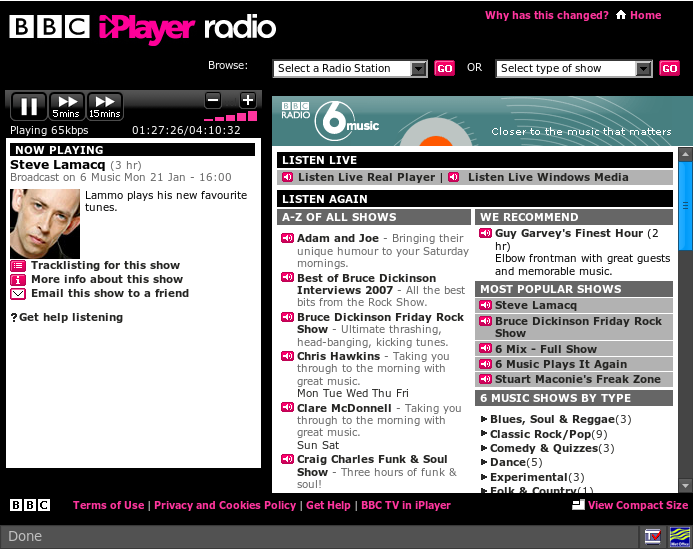
Another thing that I did was to fire Alacarte, Gnome's menu editor, and add Configuration Editor (also known as GConf, I believe) to the System tools submenu on the Applications menu. Once added to the menu, I fired up the said application. Navigating to desktop > gnome > url-handlers > rtsp, I changed the command to realplay "%s". While I don't know if this helps, it certainly was no hindrance and I got the result that I wanted and in high quality audio too.
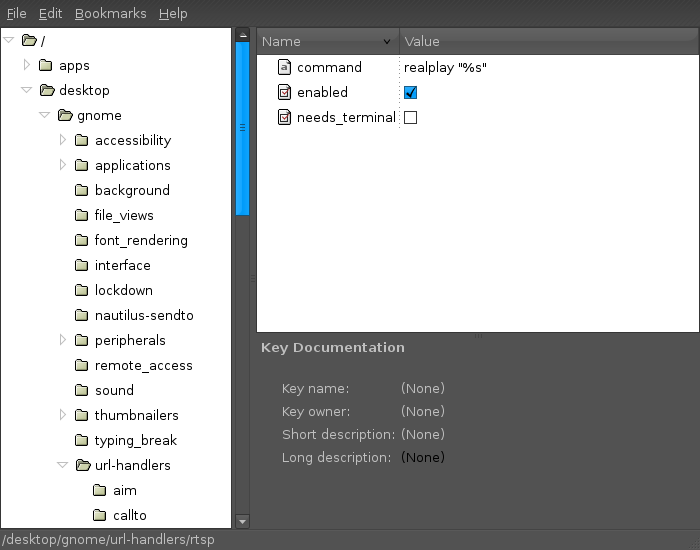
A different Firefox…
17th November 2007On Ubuntu, I made a move to using Ubuntuzilla's deployment of Firefox. Because Firefox's Gecko engine is used by other parts of Ubuntu, any Firefox updates issued by Mozilla don't come through straight away. The idea of using Ubuntuzilla is that you get Mozilla's latest, be it Firefox, Thunderbird or Seamonkey, without having an impact on the rest of the Linux installation; while Ubuntu's Firefox is left in place, you are now presented with the vanilla Firefox for all your web surfing needs. Visually, there's not much change but for the built-in Firefox application fonts coming through in the new instance, a strange sight when you see Ubuntu's more subtle alternatives everywhere else. I tried the new tack to see if picked up RealPlayer in place of Xine, but that sadly has not been the case. Nevertheless, I now have 2.0.0.9 and the latest improvements this side of version 3.
Importing bookmarks into Firefox
8th November 2007Moving from one operating system to another like I have means that a certain amount of migration is in order. While I have already talked about migrating my email, there are lesser acts too. One of these is carrying across bookmarks into the new world. This should be an easy thing to achieve and, for the most part, it is. However, the Import... entry on the File menu of the main browser only brings in bookmarks from other applications. To get more flexibility, you need to open up the Bookmarks Manager window from the Bookmarks menu (Organise Bookmarks... is the entry that you need). The File menu of the Bookmarks Manager has entries named Import... and Export...; their functions should be very apparent. The former will read from a file, very useful if you do not want to disrupt what you already have. Another migration option is the potentially disruptive act of copying in an alternative bookmarks.html file into your Firefox profile folder and overwriting the one that's already there.
Getting rid of mistakenly added mispellings from your custom dictionary in Firefox
22nd October 2007Mozilla Firefox includes a spell checker and, like any such function, it offers a chance to add words to a custom dictionary. Of course, you can also add misspellings too, and these definitely need to be removed. With Word, it's a matter of looking for custom.dic and deleting the nefarious item. With Firefox, it's similar, at least on Windows anyway. The file that you need to edit is persdict.dat which you'll find it in C:\Documents and Settings\[user name]\Application Data\Mozilla\Firefox\Profiles\[random name].default. My search for the relevant information took me over to Lifehacker.
Update 2012-12-11: For users of Linux, the location of the above file is as follows: /home/[user id]/.mozilla/firefox/[random name].default. Once you find persdict.dat in there, the required editing can be performed.
CSS Control of Text Wrapping
11th September 2007Recently, I spotted a request for a dropdown list like that which you see below. I managed to create it using the CSS, but it only worked for Firefox, so I couldn't suggest it to the requester.
form select, form select option {width: 185px; white-space: normal;}
form select {height: 16px; width: 200px; white-space: normal;}
form {margin: 300px auto 0 auto; width: 300px;}
Here's how it looks in Firefox 2:

And in IE6:
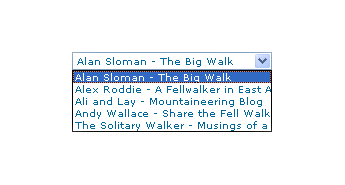
And in Opera 9:

It would be nice if the white-space attribute gave the same result in all three but hey ho... As it happens, the W3C are working up other possible ways of controlling text wrapping in (X)HTML elements, but that's for the future, and I'll be expecting it when I see it.
For menus with wrapped entries, using DHTML menus and DOM scripting seems the best course for now. I suppose that you could always make the entries shorter, which is precisely what I tend to do; I am pragmatic like that. Nevertheless, there's never any harm in attempting to push the boundaries. You just have to come away from the cutting edge at the first sign of bleeding...
Of course, if anyone had other ideas, please let me know.
FCKEditor for WordPress
26th July 2007Because the standard WordPress post editor got broken on this blog, my mind turned to replacing it, especially when I spied plugins for adding FCKEditor to the thing. Dean Lee's is the one that I am using, and it seems to work well so far too. As this is FCKEditor, there are more editing options than those offered by the WordPress standard and that's even with the advanced options made visible with the Alt+V/Alt+Shift+V keyboard shortcuts; the former is for IE and the latter for Firefox. We'll see how it goes from here...
The return of the Navigator
13th June 2007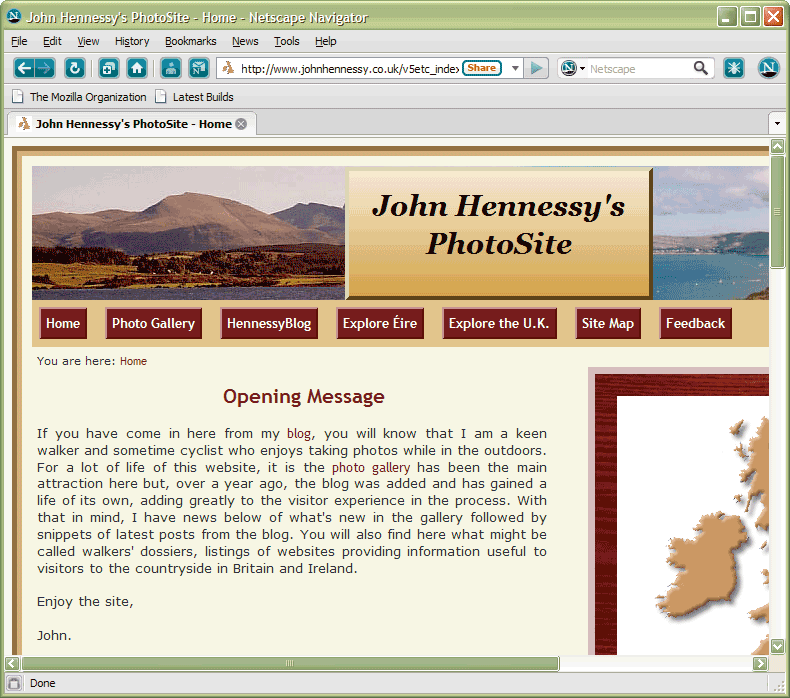
With the launch of the ill-fated Communicator, Netscape dispensed with the Navigator brand that had served it so well up to that point. And it continued the practice when it turned to re-branding the output from the Mozilla project. The new Navigator is, in essence, a tweaked variant of Firefox's latest incarnation and has the spelling checking capability that I have been missing when giving Safari a spin. You have to ask why, and I am not certain that I have the answer. That said, it does feel slick and works well, a definite change from some of it predecessors then.
Safari on Windows?
12th June 2007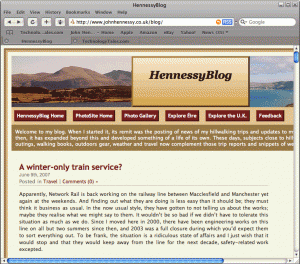 Steve Jobs recently surprised an audience at Apple's Worldwide Developer's Conference with the announcement that the Safari web browser is being made available for Windows. While everyone else is awaiting Apple's forthcoming iPhone, the Safari announcement is a more important one to me; not being big on phones, I will let the iPhone excitement pass me by. Without either buying a Mac or running OS X in a virtual machine, there was no other way for me to test my web pages in Safari bar looking for a rendering site on the web. Now, that has all changed, and I have downloaded the beta to have a look; it should iron out any rough edges that Mac users have been seeing.
Steve Jobs recently surprised an audience at Apple's Worldwide Developer's Conference with the announcement that the Safari web browser is being made available for Windows. While everyone else is awaiting Apple's forthcoming iPhone, the Safari announcement is a more important one to me; not being big on phones, I will let the iPhone excitement pass me by. Without either buying a Mac or running OS X in a virtual machine, there was no other way for me to test my web pages in Safari bar looking for a rendering site on the web. Now, that has all changed, and I have downloaded the beta to have a look; it should iron out any rough edges that Mac users have been seeing.
Update: Safari seems to have got a mixed reaction from Windows users; some have tried it with Vista and cited issues. Another gripe has been its memory footprint, but I have seen Firefox take up 100 MB.
Wonders of the middle mouse button
26th February 2007My installation of Firefox seems to have stopped listening to the target attribute of hyperlinks. Thankfully, the middle mouse button comes to the rescue. Clicking on a link with the middle button opens it the destination page up in a new window or tab, depending on how you set your defaults. The behaviour goes even further than this: the trusty middle mouse button does the same for bookmarks and the Google search bar; all very useful. And it is not just a Firefox thing, either. IE7 does the same thing for web page hyperlinks and bookmarks while in Opera, it is limited to links on web pages.